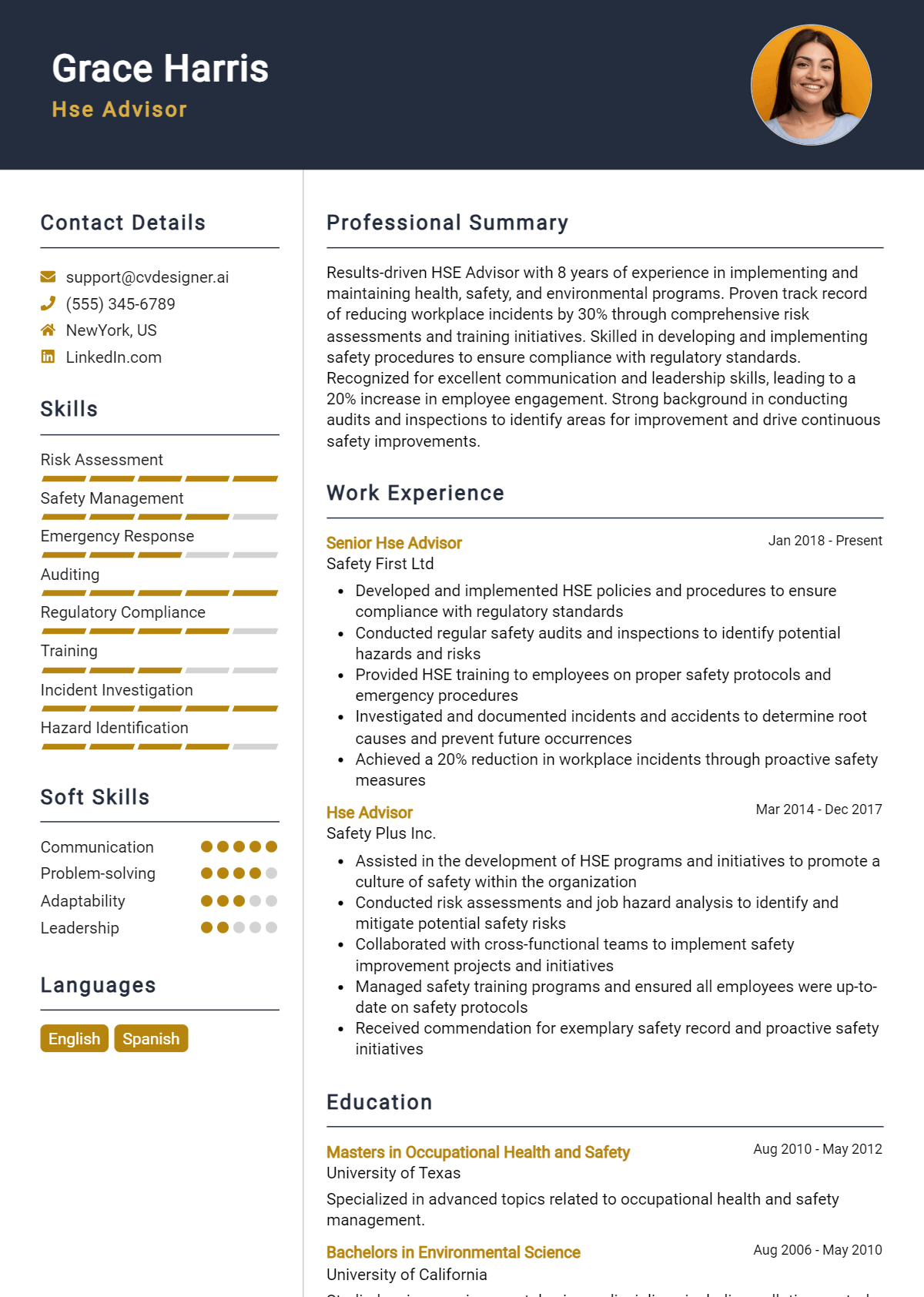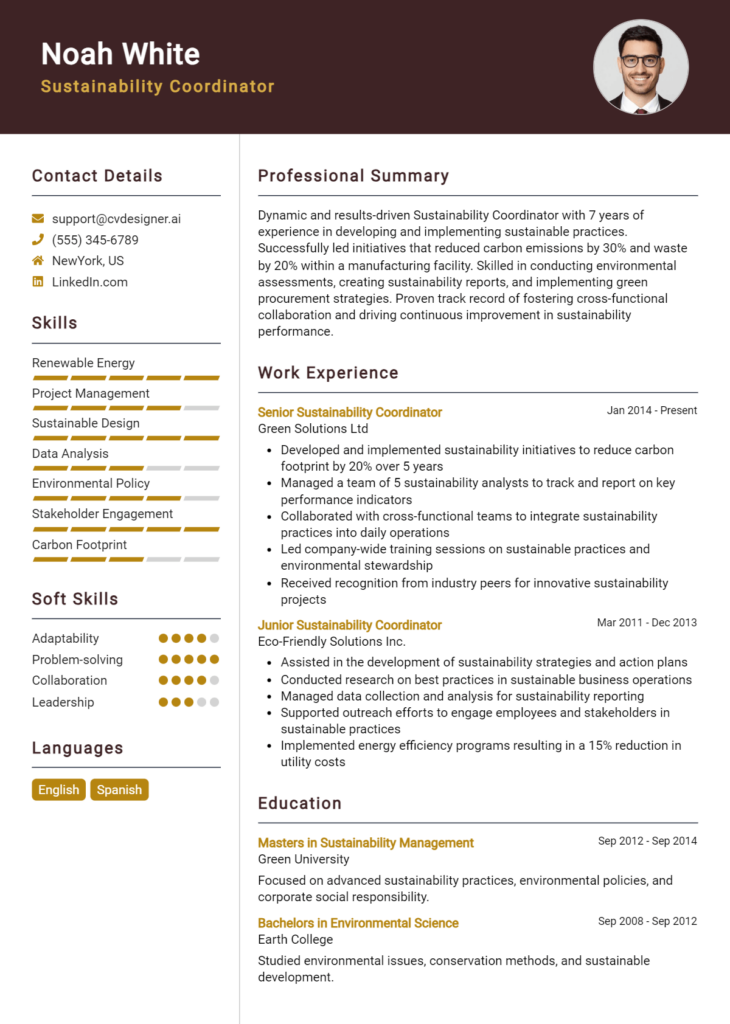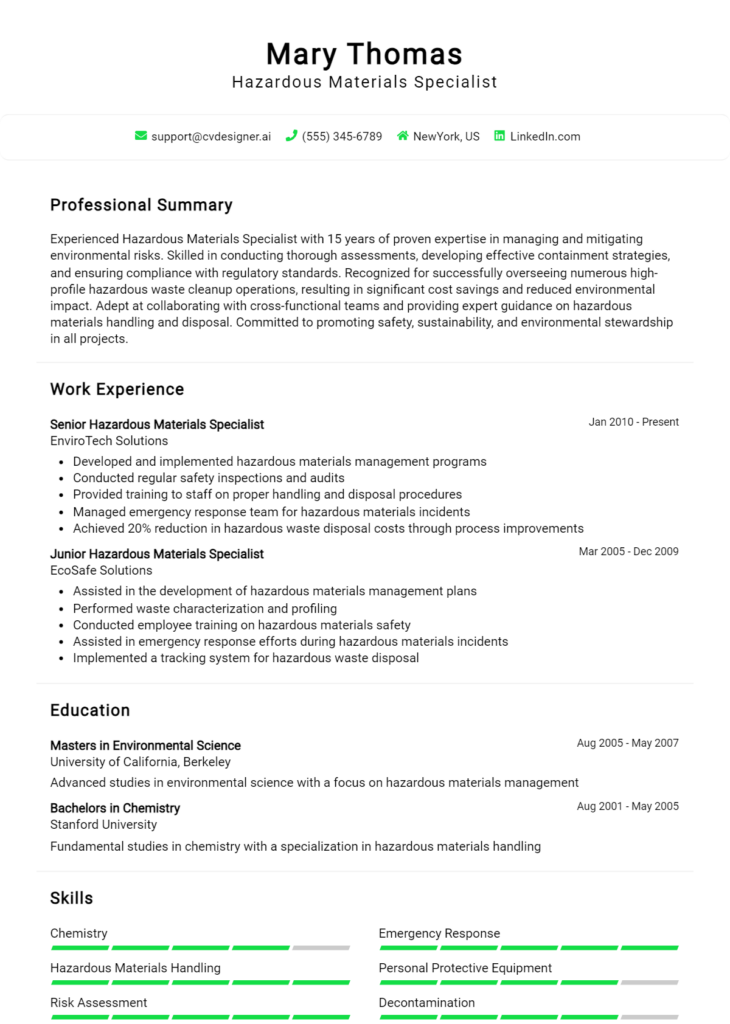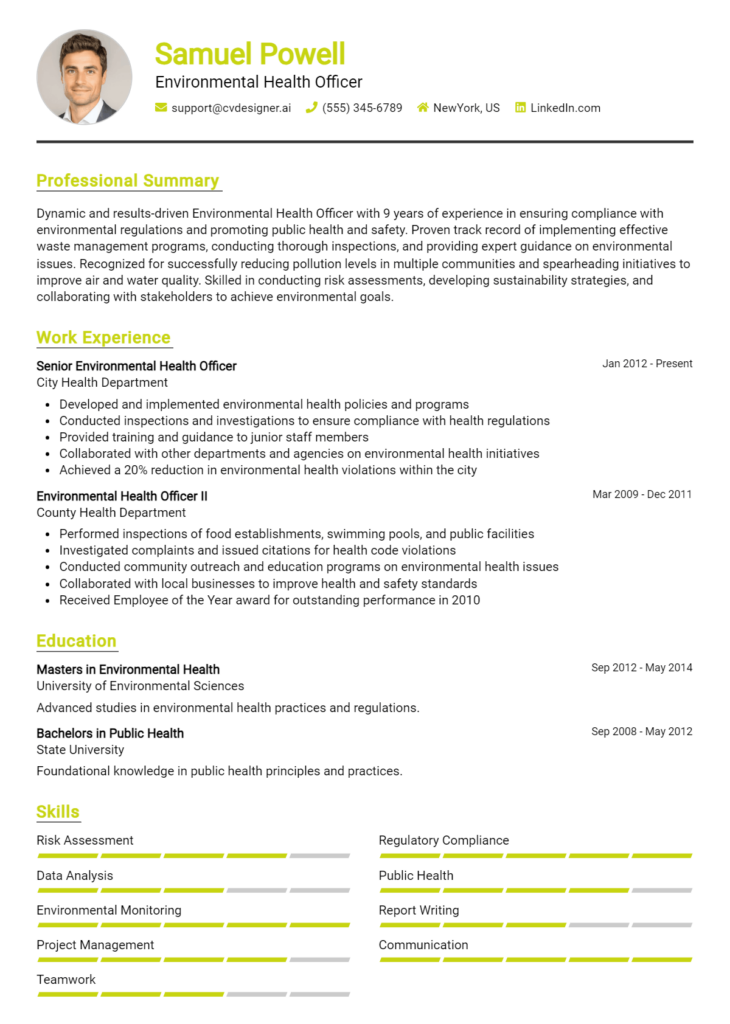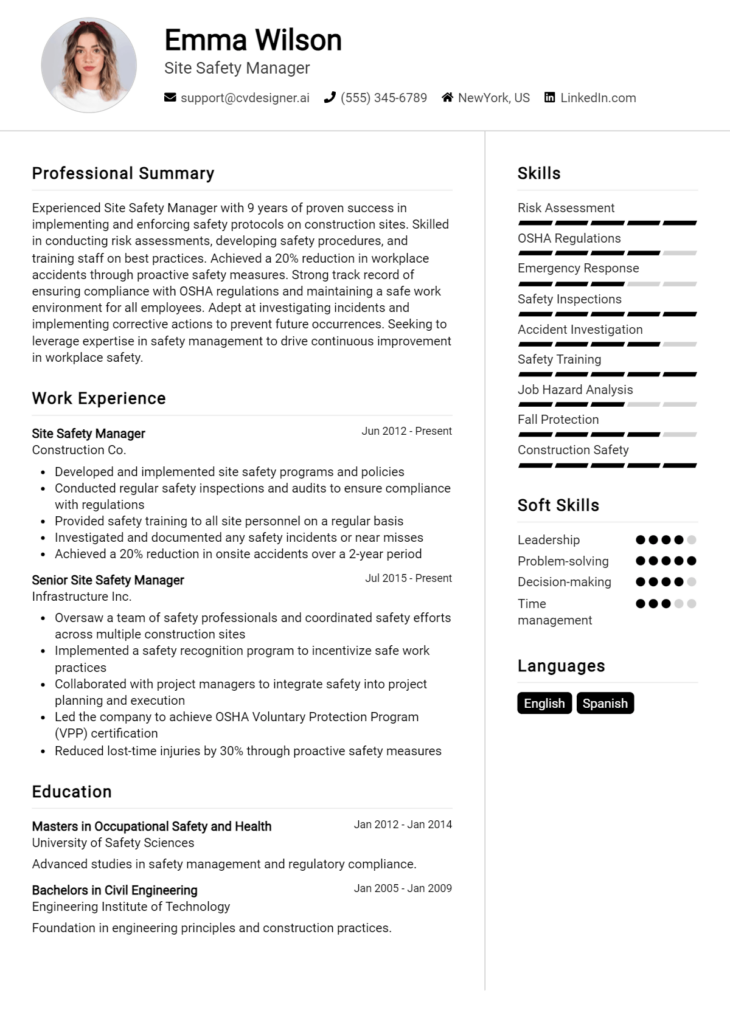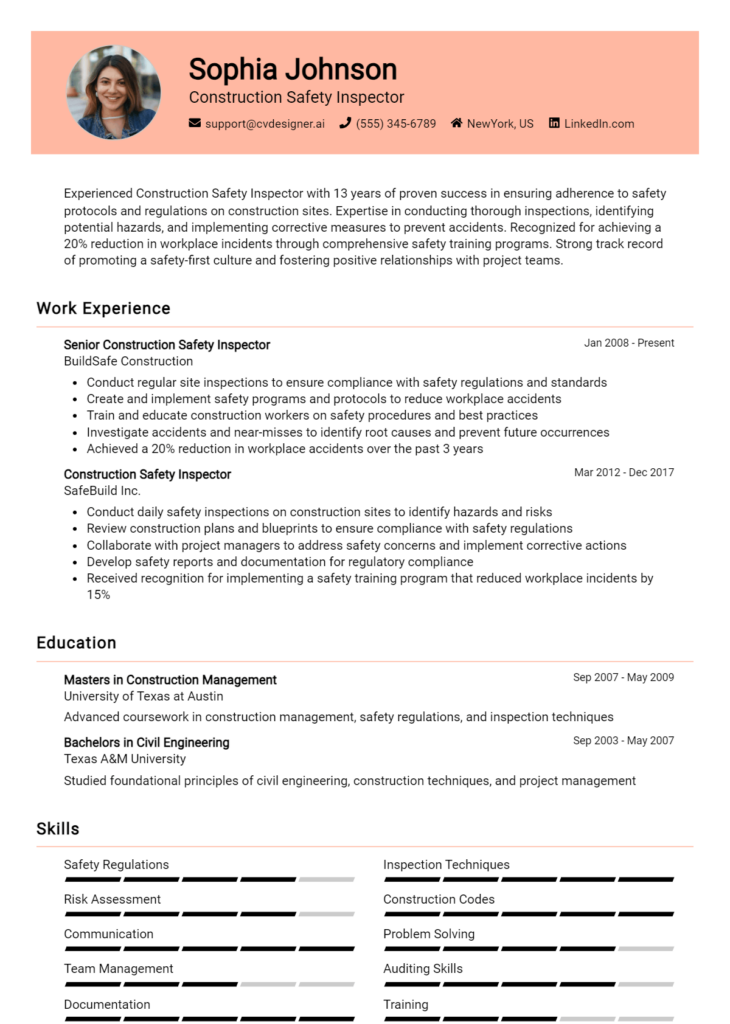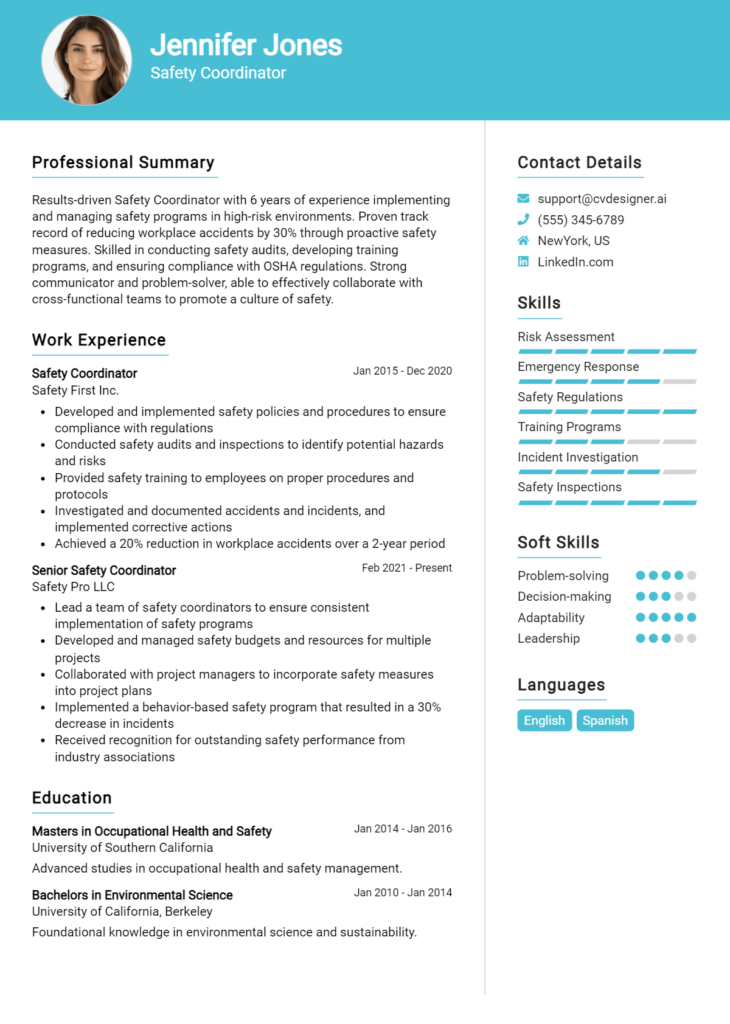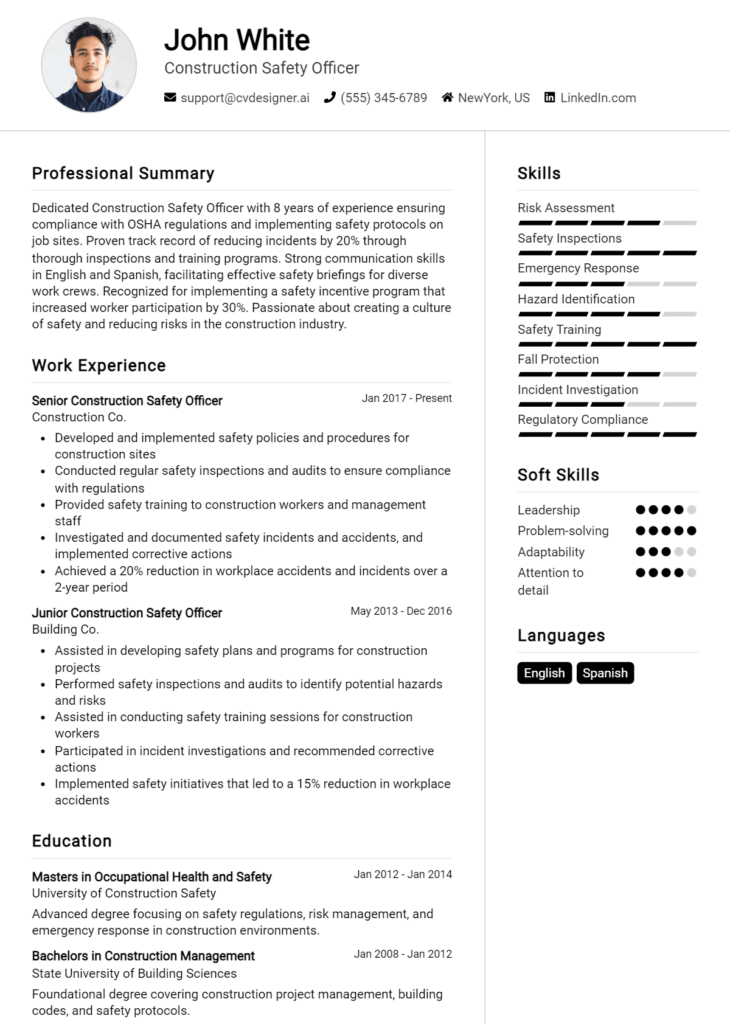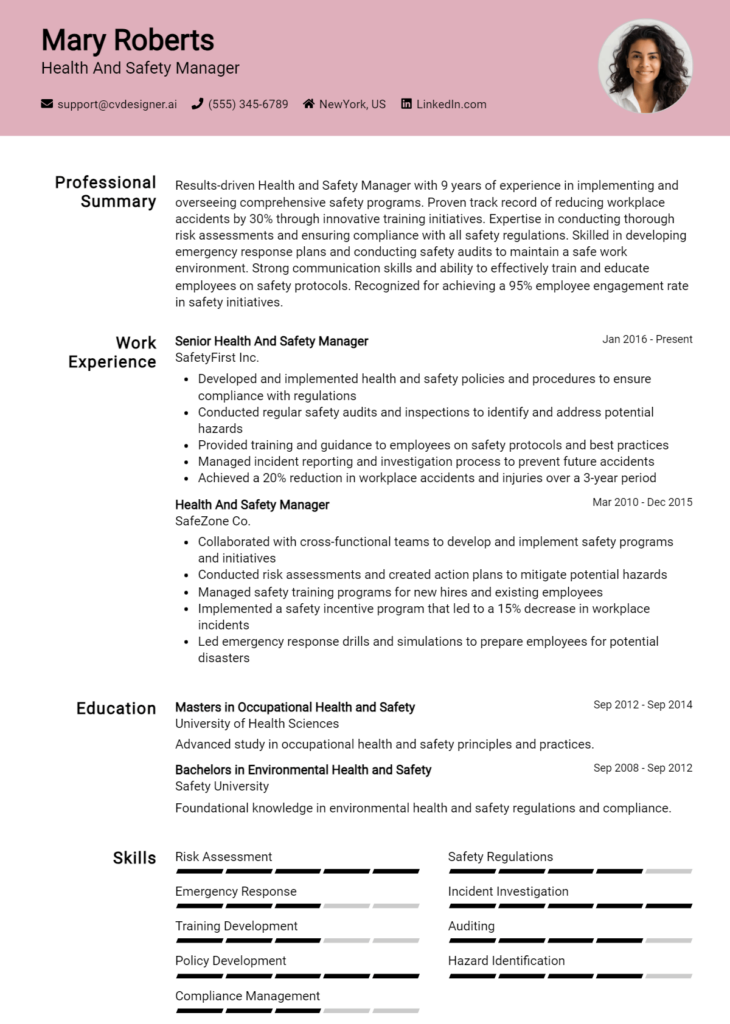HSE Advisor Core Responsibilities
As an HSE Advisor, professionals are tasked with ensuring compliance with health, safety, and environmental regulations across various departments. Key responsibilities include conducting risk assessments, implementing safety protocols, and providing training to staff. Strong technical knowledge, operational insight, and exceptional problem-solving skills are vital in effectively bridging gaps between departments and fostering a culture of safety. These competencies contribute significantly to the organization’s overall goals, making a well-structured resume essential for showcasing these qualifications.
Common Responsibilities Listed on HSE Advisor Resume
- Conduct health and safety audits and inspections
- Develop and implement safety management systems
- Provide training and guidance on HSE policies
- Monitor compliance with relevant regulations
- Identify potential hazards and recommend corrective actions
- Prepare reports on safety performance and incidents
- Collaborate with cross-functional teams to improve safety practices
- Investigate accidents and near-misses to determine root causes
- Maintain records of HSE activities and compliance
- Advise management on health and safety matters
- Facilitate emergency response planning and drills
High-Level Resume Tips for HSE Advisor Professionals
In the competitive landscape of health, safety, and environmental (HSE) roles, a well-crafted resume is essential for professionals looking to make a strong first impression. As the initial touchpoint between you and potential employers, your resume must effectively showcase not only your skills but also your achievements in the field. A thoughtfully designed resume can highlight your commitment to safety practices, regulatory compliance, and risk management, setting you apart from other candidates. This guide will offer practical and actionable resume tips specifically tailored for HSE Advisor professionals to enhance your prospects in this vital industry.
Top Resume Tips for HSE Advisor Professionals
- Tailor your resume to the specific job description by incorporating relevant keywords and phrases used in the posting.
- Highlight your experience in developing and implementing HSE policies and procedures to demonstrate your expertise.
- Quantify your achievements where possible, such as reducing incident rates or improving compliance scores, to provide concrete evidence of your impact.
- Showcase your certifications and training, such as NEBOSH or IOSH, prominently to validate your qualifications.
- Include a dedicated skills section that emphasizes industry-specific competencies, such as risk assessment, safety audits, and emergency response planning.
- Utilize action verbs in your job descriptions to convey your contributions and initiatives clearly and compellingly.
- Incorporate relevant professional affiliations or memberships, as they can reflect your commitment to ongoing professional development.
- Keep the format clean and professional, ensuring that your resume is easy to read and visually appealing.
- Use bullet points for clarity and simplicity, making it easier for hiring managers to scan your qualifications quickly.
- Proofread your resume thoroughly to eliminate any errors, as mistakes can detract from your professionalism and attention to detail.
By implementing these tailored resume tips, HSE Advisor professionals can significantly increase their chances of landing a job in this field. A focused and polished resume not only communicates your technical skills and achievements effectively but also demonstrates your dedication to safety and environmental stewardship, making you a compelling candidate in the eyes of potential employers.
Why Resume Headlines & Titles are Important for HSE Advisor
In the competitive field of health, safety, and environmental (HSE) management, a well-crafted resume headline or title is essential for HSE Advisors. These headlines serve as the first impression for hiring managers, encapsulating a candidate's key qualifications in just a few impactful words. A strong headline not only grabs attention but also succinctly conveys the candidate's expertise and relevance to the role being applied for. By being concise and directly related to the job, a powerful resume headline can significantly enhance a candidate’s chances of standing out in a crowded job market.
Best Practices for Crafting Resume Headlines for HSE Advisor
- Keep it concise: Aim for a headline that is brief yet informative, ideally no more than 10 words.
- Be role-specific: Tailor the headline to reflect the specific position of HSE Advisor.
- Highlight key qualifications: Include your most relevant skills or certifications.
- Use impactful language: Choose strong action words that convey confidence and expertise.
- Incorporate metrics when possible: Quantify achievements or experiences to add credibility.
- Avoid generic phrases: Steer clear of overused terms that don’t differentiate you from other candidates.
- Showcase unique strengths: Emphasize what sets you apart, such as specialized training or unique experiences.
- Align with job description: Mirror the language and key terms used in the job posting for better alignment.
Example Resume Headlines for HSE Advisor
Strong Resume Headlines
Certified HSE Advisor with 10+ Years of Industry Experience
Proven Track Record in Reducing Workplace Incidents by 30%
Results-Driven HSE Professional Specializing in Risk Management
Expert in Developing Comprehensive Safety Training Programs
Weak Resume Headlines
HSE Advisor Looking for Job
Safety Professional with Some Experience
Strong resume headlines are effective because they communicate specific expertise and accomplishments that resonate with hiring managers, showcasing the candidate's value right away. In contrast, weak headlines fail to impress due to their vagueness and lack of detail, making it difficult for employers to gauge the candidate's suitability for the role. By using strong, targeted headlines, candidates can create a powerful first impression that encourages further review of their resume.
Writing an Exceptional HSE Advisor Resume Summary
A resume summary is an essential element for HSE Advisors aiming to make a strong impression on hiring managers. This concise introduction serves as the first opportunity to demonstrate your key skills, relevant experience, and notable accomplishments in health, safety, and environmental management. A well-crafted summary quickly captures the attention of recruiters, allowing them to see your potential value to their organization. It should be impactful, succinct, and tailored specifically to reflect the requirements of the job you are applying for, ensuring that you stand out in a competitive job market.
Best Practices for Writing a HSE Advisor Resume Summary
- Quantify Achievements: Use numbers and statistics to provide concrete evidence of your successes.
- Focus on Relevant Skills: Highlight specific skills that are directly applicable to the HSE Advisor role.
- Tailor to the Job Description: Customize your summary to reflect the specific requirements and language of the job listing.
- Keep it Concise: Aim for 3-5 sentences that deliver your message clearly and effectively.
- Use Action-Oriented Language: Start with strong action verbs to convey your impact and contributions.
- Showcase Certifications: Mention any relevant certifications or training that enhance your qualifications.
- Highlight Soft Skills: Include interpersonal skills that are crucial for effective communication and teamwork in HSE roles.
- Demonstrate Industry Knowledge: Incorporate industry-specific terminology and trends to show your expertise.
Example HSE Advisor Resume Summaries
Strong Resume Summaries
Dedicated HSE Advisor with over 8 years of experience in implementing safety programs that reduced workplace incidents by 30%. Proven track record of conducting thorough risk assessments and developing training modules that enhance employee engagement and compliance.
Results-driven HSE professional with a strong background in environmental management and safety regulations. Successfully led a team to achieve ISO 14001 certification, improving operational efficiency by 25% while ensuring full compliance with legal standards.
Proficient HSE Advisor with expertise in hazard identification and mitigation strategies, recognized for decreasing accident rates by 40% in industrial settings through effective training and proactive safety measures. Holds multiple certifications, including NEBOSH and IOSH.
Weak Resume Summaries
HSE Advisor with some experience in safety and environmental issues. Looking for a new opportunity to apply my skills.
I am a safety professional who has worked in various environments. I can help companies improve their safety programs.
The examples provided illustrate the difference between strong and weak resume summaries. Strong summaries are specific, quantifiable, and directly relevant to the HSE Advisor role, showcasing achievements and skills that align with the job requirements. In contrast, weak summaries tend to be vague, lack measurable outcomes, and fail to convey a clear value proposition to potential employers, making them less effective in capturing attention.
Work Experience Section for HSE Advisor Resume
The work experience section is a vital component of an HSE Advisor resume as it serves as a platform to demonstrate the candidate's technical skills and their effectiveness in managing teams while ensuring compliance with health, safety, and environmental regulations. This section allows candidates to present their ability to deliver high-quality products while minimizing risks and enhancing safety protocols. By quantifying achievements and aligning their experience with industry standards, candidates can effectively showcase their value to potential employers, making it crucial for their success in securing the desired position.
Best Practices for HSE Advisor Work Experience
- Clearly outline your technical expertise in health, safety, and environmental management systems.
- Use quantifiable metrics to illustrate achievements, such as reduced incident rates or cost savings.
- Highlight specific projects or initiatives that demonstrate leadership in safety practices.
- Emphasize collaboration with cross-functional teams to enhance safety culture.
- Detail any relevant certifications or training that complement your work experience.
- Tailor your experience to align with the job description and industry standards.
- Include examples of successful audits or inspections conducted under your supervision.
- Showcase your ability to implement and monitor compliance with safety regulations effectively.
Example Work Experiences for HSE Advisor
Strong Experiences
- Led a cross-departmental safety initiative that resulted in a 30% reduction in workplace accidents over two years, enhancing overall employee safety.
- Implemented a new environmental management system that achieved ISO 14001 certification within 12 months, reducing waste disposal costs by 25%.
- Conducted over 50 safety audits and inspections, leading to the identification and mitigation of hazardous conditions, resulting in a 15% decrease in incident reports.
- Developed and delivered training programs for over 200 employees, improving safety awareness and compliance rates by 40% within the first year.
Weak Experiences
- Performed safety inspections occasionally, which helped with some compliance issues.
- Assisted in safety training sessions without specific outcomes or improvements noted.
- Worked on safety-related projects with little detail on responsibilities or results achieved.
- Participated in team meetings to discuss safety but did not take any active role.
The examples provided illustrate the contrast between strong and weak experiences. Strong experiences are characterized by specific, quantifiable outcomes that demonstrate effective leadership and collaboration in HSE practices, showcasing the candidate's ability to drive results. In contrast, weak experiences lack detail and measurable achievements, making them less impactful and failing to highlight the candidate's true capabilities in the health, safety, and environmental field.
Education and Certifications Section for HSE Advisor Resume
The education and certifications section of a HSE Advisor resume is crucial in establishing the candidate's qualifications and expertise in health, safety, and environmental management. This section not only showcases the academic background that provides foundational knowledge but also emphasizes industry-relevant certifications that reflect the candidate's commitment to professional development and adherence to industry standards. By including relevant coursework, specialized training, and certifications, candidates can significantly enhance their credibility and demonstrate their alignment with the specific requirements of the HSE Advisor role. This section serves as a vital tool for potential employers to assess the candidate's preparedness and dedication to ensuring workplace safety and compliance.
Best Practices for HSE Advisor Education and Certifications
- Prioritize relevance: Focus on degrees and certifications that are directly related to health, safety, and environmental management.
- Provide specific details: Include the names of institutions, dates of completion, and any honors or distinctions received.
- Highlight advanced credentials: Mention any advanced certifications such as NEBOSH, OSHA, or ISO certifications that enhance your qualifications.
- Include relevant coursework: List specific courses that pertain to safety regulations, risk management, or environmental science.
- Showcase continuous learning: Include any recent training or workshops that demonstrate your commitment to staying updated in the field.
- Use clear formatting: Organize the section in a clean and readable format to make it easy for hiring managers to scan your qualifications.
- Tailor to the job description: Adjust the focus of this section based on the specific requirements listed in the job posting.
- Mention professional affiliations: Include memberships in relevant organizations or societies to further establish your professional network.
Example Education and Certifications for HSE Advisor
Strong Examples
- Bachelor of Science in Occupational Health and Safety, University of XYZ, 2020
- NEBOSH International General Certificate in Occupational Health and Safety, 2021
- OSHA 30-Hour General Industry Safety and Health Certification, 2022
- Advanced Diploma in Environmental Management, Institute of Environmental Professionals, 2023
Weak Examples
- Associate Degree in General Studies, Community College, 2018
- Certification in Basic First Aid, 2016 (not industry-specific)
- High School Diploma, 2015
- Outdated HSE Certification from 2010 (no longer recognized)
The strong examples listed showcase relevant degrees and current certifications that align closely with the HSE Advisor role, illustrating the candidate's preparedness and expertise in the field. In contrast, the weak examples demonstrate educational qualifications and certifications that are either outdated, irrelevant, or not specific to health, safety, and environmental management, which may detract from the candidate's suitability for the position. By focusing on strong, relevant credentials, candidates can effectively highlight their qualifications and increase their chances of securing an interview.
Top Skills & Keywords for HSE Advisor Resume
As an HSE Advisor, possessing the right skills is crucial not only for securing a job but also for excelling in the role. The combination of both hard and soft skills can significantly impact your ability to ensure workplace safety, compliance with regulations, and the overall health of employees. A well-crafted resume that highlights these skills will demonstrate your expertise and readiness to tackle the challenges associated with health, safety, and environmental management. By showcasing your capabilities effectively, you can stand out to potential employers looking for candidates who can proactively contribute to a safe working environment.
Top Hard & Soft Skills for HSE Advisor
Soft Skills
- Strong communication skills
- Problem-solving abilities
- Attention to detail
- Leadership and team management
- Critical thinking
- Adaptability and flexibility
- Conflict resolution
- Empathy and emotional intelligence
- Time management
- Interpersonal skills
Hard Skills
- Knowledge of HSE regulations and standards
- Risk assessment and management
- Incident investigation techniques
- Environmental monitoring and compliance
- First aid and CPR certification
- Safety audit and inspection proficiency
- Training and development for safety protocols
- Proficient in HSE software and data analysis
- Emergency response planning
- Report writing and documentation skills
Highlighting these skills in your resume will not only reflect your qualifications but also your commitment to fostering a culture of safety and compliance within an organization. Additionally, detailing relevant work experience alongside these skills will provide a comprehensive picture of your capabilities as an HSE Advisor.
Stand Out with a Winning HSE Advisor Cover Letter
Dear Hiring Manager,
I am writing to express my enthusiasm for the HSE Advisor position at [Company Name] as advertised on [Job Board/Company Website]. With a robust background in health, safety, and environmental management, complemented by my certification in NEBOSH and extensive experience in various industries, I am confident in my ability to contribute effectively to your team and help foster a culture of safety within your organization. My proactive approach to risk assessment and mitigation has consistently resulted in improved safety performance and compliance with regulatory standards.
In my previous role at [Previous Company Name], I successfully led initiatives that enhanced workplace safety, resulting in a 30% reduction in incidents over a two-year period. I implemented comprehensive training programs that educated employees on best practices and emergency response procedures. Furthermore, my ability to conduct thorough audits and inspections has ensured that all safety protocols are not only met but exceeded, aligning with both corporate policies and local regulations. I am particularly proud of my work in developing a safety management system that streamlined reporting processes, making it easier for teams to identify and address potential hazards promptly.
I am particularly drawn to [Company Name] because of your commitment to sustainability and safety excellence. I admire your innovative approaches to HSE practices and believe that my background in environmental protection initiatives can add value to your ongoing projects. I thrive in collaborative environments and am eager to work alongside your team to cultivate a proactive safety culture that not only protects employees but also enhances operational efficiency and productivity.
Thank you for considering my application. I look forward to the opportunity to discuss how my skills and experiences align with the goals of [Company Name]. I am excited about the possibility of contributing to your team and helping to uphold the highest standards of safety and environmental stewardship.
Sincerely,
[Your Name]
[Your Phone Number]
[Your Email Address]
Common Mistakes to Avoid in a HSE Advisor Resume
When crafting a resume for the role of a Health, Safety, and Environmental (HSE) Advisor, it's crucial to present a professional and polished document that accurately reflects your qualifications and experiences. However, many candidates make common mistakes that can undermine their chances of securing an interview. Avoiding these pitfalls can significantly enhance your resume's effectiveness and ensure that you stand out in a competitive job market.
Lack of Specificity: Failing to provide specific examples of your accomplishments can make your resume less impactful. Instead of saying "managed safety protocols," detail the specific protocols you implemented and the results achieved.
Overly Technical Language: While familiarity with industry jargon is important, using too much technical language can alienate HR personnel who may not have a technical background. Strive for clarity and accessibility in your descriptions.
Ignoring Keywords: Many employers utilize Applicant Tracking Systems (ATS) to filter resumes. Neglecting to include relevant keywords from the job description can result in your resume being overlooked.
Inconsistent Formatting: A cluttered or inconsistent format can make your resume difficult to read. Ensure uniformity in font, headings, and bullet points to create a clean and professional appearance.
Failure to Highlight Soft Skills: While technical expertise is essential, overlooking the importance of soft skills such as communication, teamwork, and problem-solving can weaken your resume. Be sure to include examples that showcase these abilities.
Listing Duties Instead of Achievements: Simply listing job duties does not demonstrate your impact. Focus on your achievements and contributions in previous roles, quantifying them when possible (e.g., reduced incidents by X%).
Neglecting Continuing Education: The field of HSE is constantly evolving. Failing to mention any recent certifications, training, or workshops can suggest a lack of commitment to professional development.
Too Lengthy or Too Short: A resume that is either too lengthy or too brief can be off-putting. Aim for a concise yet comprehensive document, ideally one to two pages, that effectively communicates your qualifications without overwhelming the reader.
Conclusion
As an HSE Advisor, your role is critical in ensuring the safety and health of employees while promoting environmental sustainability within the organization. Throughout this article, we have discussed the essential skills and qualifications required for the position, including risk assessment, compliance with health and safety regulations, and effective communication strategies.
We’ve also highlighted the importance of continuous professional development in staying updated with the latest safety standards and practices. Understanding the dynamics of workplace safety and being proactive in hazard identification and mitigation can significantly impact overall organizational success.
Now is the perfect time to take a closer look at your career documents, especially your resume, to ensure they reflect your expertise and accomplishments effectively. A well-crafted resume is essential for standing out in this competitive field. Utilize the available tools to enhance your application materials—check out the resume templates, create your own with the resume builder, draw inspiration from resume examples, and polish your applications with cover letter templates.
Take action today and make sure your resume truly represents the value you bring as an HSE Advisor!

